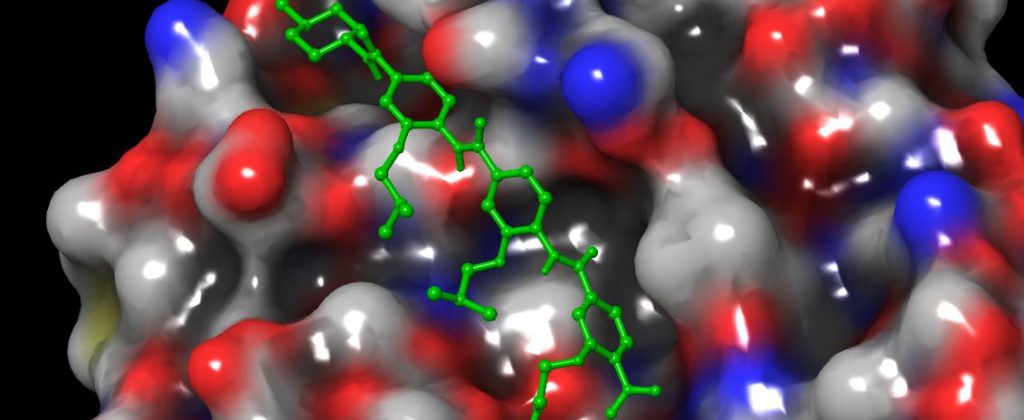Protein-protein interactions are one of the fundamental cellular processes and involve in regulation of numerous key pathways. My research primarily focuses on rational design of small molecules to emulate functions of proteins and developing efficient synthetic methodologies. Over years, we have successfully developed promising molecules with potent biological activities targeting cancer and diabetes.
WFAA Ch.8 ABC TV News
“This is my playground, this is where we have fun. We are constantly looking for what our molecules can do,” Ahn told WFAA at a lab at UT Dallas. …”
UT Dallas News Articles
“A new molecule synthesized by a University of Texas at Dallas researcher kills a broad spectrum of hard-to-treat cancers, including triple-negative breast cancer, by exploiting a weakness in cells not previously targeted by other drugs. A study describing the research — which was carried out in isolated cells, in human cancer tissue and in human cancers grown in mice — was published online June 2 in the journal Nature Cancer. Dr. Jung-Mo Ahn, a co-corresponding author of the study and a UT Dallas associate professor of chemistry and biochemistry in the School of Natural Sciences and Mathematics, has been passionate about his work designing small molecules that target protein-protein interactions in cells for over a decade. Using an approach called structure-based rational drug design, he previously developed potential therapeutic candidate compounds for treatment-resistant breast cancer and for prostate cancer. In the current work, Ahn and his colleagues tested a novel compound he synthesized called ERX-41 for its effects against breast cancer cells, both those that contain estrogen receptors (ERs) and those that do not. While there are effective treatments available for patients with ER-positive breast cancer, there are few treatment options for patients with triple-negative breast cancer (TNBC), which lacks receptors for estrogen, progesterone and human epidermal growth factor 2. TNBC generally affects women under 40 and has poorer outcomes than other types of breast cancer. …”
“Dr. Jung-Mo Ahn, associate professor of chemistry and biochemistry at The University of Texas at Dallas, has designed a small molecule that could help breast cancer patients for whom current treatments no longer work. In a paper published recently in the online journal
eLife, Ahn and his colleagues describe their approach to designing the molecule as well as experiments that show its effectiveness at stopping the progression of treatment-resistant breast cancer cells in isolation and in an animal model. According to the
National Cancer Institute, about 80 percent of breast cancers in women depend on the hormone estrogen to grow. Breast cancer cells in these patients contain proteins called estrogen receptors (ERs) that bind to the hormone and fuel cancer’s growth. For these ER-positive patients, treatment typically takes one of two tracks: drug regimens that stifle the body’s production of estrogen, or drugs that bind to estrogen receptors and block the hormone from attaching. In some patients, however, breast cancer becomes resistant to estrogen-blocking therapy. That happens when estrogen receptors in breast cancer cells mutate and change shape, leaving no place for the drugs to attach. With or without genetic mutations, the receptor still needs to recruit other proteins in the cell, called co-regulators, which promote tumor growth. “Upon estrogen binding, estrogen receptors interact with other proteins like co-regulators to stimulate cancer cell growth,” Ahn said. “Blocking these co-regulators is a new mode of action that could overcome treatment barriers. …”
“Dr. Jung-Mo Ahn, associate professor of chemistry at The University of Texas at Dallas, has designed and synthesized a novel, small molecule that might become a large weapon in the fight against prostate cancer. In a study published online May 28 in the journal Nature Communications, Ahn and his colleagues at UT Southwestern Medical Center describe the design of the molecule, as well as laboratory tests that show its effectiveness at blocking the cancer-promoting function of proteins called androgen receptors. Androgen receptors are found inside cells and have complex surfaces with multiple “docking points,” where various proteins can bind to the receptor. Each docking point has a unique shape, so only a correctly shaped molecule will fit. …”
“Molecules that attempt to trick cancer cells into killing themselves off are the latest weapons being tested to wage and win the war on cancer. The Cancer Prevention and Research Institute of Texas (CPRIT) has awarded $886,000 to Dr. Jung-Mo Ahn to study a new class of molecules designed to wring the life out of prostate cancer cells. Ahn, an assistant professor of chemistry, is testing compounds called tris-benzamides. Tris-benzamides may coax cancer cells into behaving like normal cells, which eventually allow themselves to die in a process called apoptosis, or programmed cell death. “Cancer cells bypass apoptosis by overproducing anti-apoptotic proteins that block the cells from dying, so they live on and wreak havoc in the body,” Ahn said. “Our tris-benzamides are specially designed to lock into the surface of anti-apoptotic proteins. It gives cancer cells a wake-up call that it’s time to die off. …”

